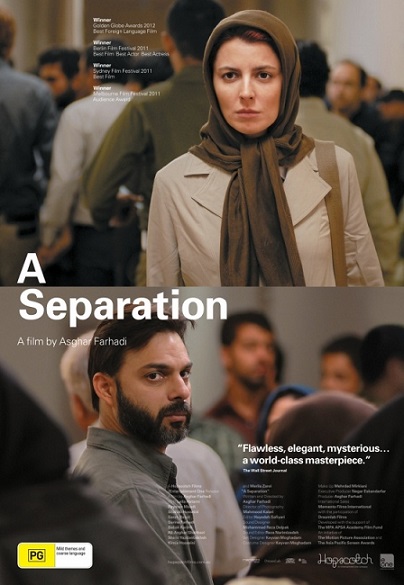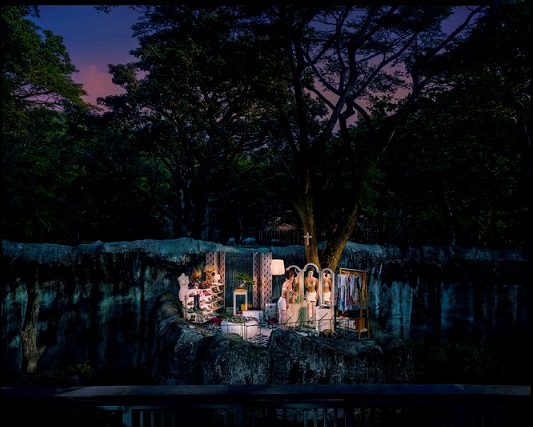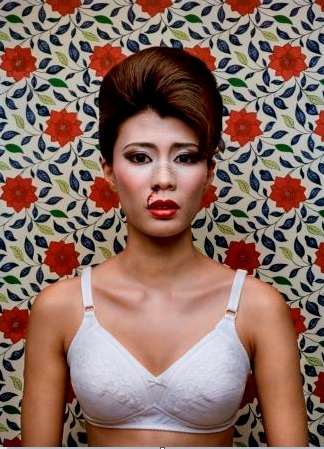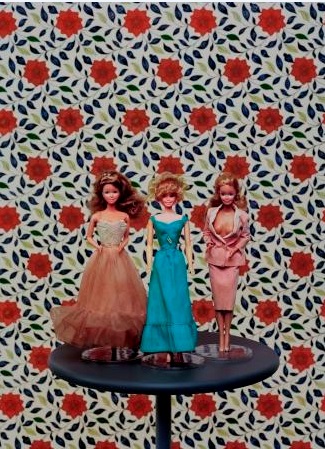藝評
「表現正常」的年輕人是改變的強大力量 / 人的莊園-周慶輝個展 (Youth’s ‘Normality’ a Potent Force for Change / Chou Chin-hui’s Animal Farm)
約翰百德 (John BATTEN)
at 7:10pm on 19th June 2015




圖片說明Captions:
1. 阿斯哈.法哈蒂的得獎作品《伊朗式離婚》電影海報
Movie poster for Asghar Farhadi's A Separation (Australian market only)
2. 周慶輝,《人的莊園No. 02》,純棉無酸相片紙, 360 x 274.3厘米, 2014
Chou Chin-hui, Animal Farm No. 02, inkjet Print, 360 x 274.3cm, 2014
3. 周慶輝,《人的莊園No. 07》,純棉無酸相片紙,, 230 x 274.3厘米, 2014
Chou Chin-hui, Animal Farm No. 07, inkjet Print, 230 x 274.3 cm, 2014
4. 周慶輝,《人的莊園No. 23》,純棉無酸相片紙,108 x 148厘米, 2014
Chou Chin-hui, Animal Farm No. 23, inkjet Print, 108 x 148 cm, 2014
5. 周慶輝,《人的莊園No. 29》,純棉無酸相片紙 ,108 x 148厘米, 2014
Chou Chin-hui, Animal Farm No. 29, inkjet Print, 108 x 148 cm, 2014
(This essay was originally published in Chinese in Ming Pao Weekly, 13 June 2015. Please scroll down for English version.)
根據《金融時報》最近刊登的報導,伊朗現世代的年輕人是「正常的一代」。好一個令人信服的想法!1979年爆發伊朗伊斯蘭革命後,伊朗在這數十年間基本上與世隔絕,國家不斷實行密不透風的文化監控制與打壓,加上由美國發起的經濟制裁,伊朗這一代年經人的世界觀與上一代的領袖不盡相同。他們大部份都居住在市區、經常上網,而且越來越不拘泥於社會階級,也不認同伊朗以往對革命的激進和對美國的憤怒態度。
從近年的伊朗電影,例如阿斯哈.法哈蒂 (Asghar Farhadi )的奧斯卡得獎作品《伊朗式離婚》(A Separation),我們可以看到伊朗的急速轉變和性格倔強的一面。法哈蒂的電影鋪陳出城鄉兩者思想開明和保守的分別,也寫出了思想開明的中產階級如何亟待離開伊朗、如何認為伊朗是一個沒有未來和自由選擇的國度。諷刺的是這些希望走出去的伊朗人,最希望到的還是美國。電影亦觸及錯綜複雜的道德困局,就是人們身為「好」回教徒,應該採取開明還是傳統的視角。電影不僅引起伊朗人的共鳴,也令其他當權決策者與年輕人關係緊張的亞洲社會(包括香港)都感同身受。
把伊朗和兩岸三地作簡單比較,中國內地在1990年代才開放經濟;台灣在1987年後才解除軍事戒嚴並引入民主;香港也是1997後才開始染指後殖民地管治。現時在大中華地區的新生代也是幾代以來最「正常」的一代。 很大程度上是因為區內冷戰仇視解除,而且像年輕的伊朗人一樣,這代人沒有歷史或教條的枷鎖,他們心中有更崇高的理想主義(雖然很多時候都是定義含糊),而且希望自己的未來能充滿機會、自由,而不會被政府責控或審查。
我最近到過潮州、廈門和台北,在幾處地方都感覺到一些相似的情緒。當然,有些情緒和香港佔領運動期間所展示的感情和訴求有點相似。令人驚訝的,是區內的年輕人都有一個普遍共識,就是他們對未來有所憧憬,而且會質疑過去。很可惜,香港的決策者像伊朗一樣,在承認社會改變上都反應甚慢。年輕一代持續不滿,他們覺得由政府發揮影響的機會微乎其微。
香港的領袖層以男性主導,他們各據山頭,擁有人脈和財富。在這樣悠然自得的環境下,他們的是非觀念和我們這些其他人可以非常不同。因此,這些領袖近期的舉措和事件,一點也不會令人意外。例如在國際足協被瑞士和美國執法機關全面調查貪污事件,並拘捕了7名高層官員的情況下,香港足球總會代表霍震霆仍在最近蘇黎世國際足協大會中投票給白禮達;新界鄉議局前任主席劉皇發的位置由他兒子繼任等。更不會令我覺得驚訝的,是西九龍文化區董事局很多新委任的成員中,有不少對香港的藝術文化界只有極少經驗或參與的人選。到目前為此,既得利益者仍然是掌握優勢的一群!
很多香港年輕人就如伊朗的新生代一樣,會公開表示有意離開香港,而台灣是他們其中一個目的地。
然而,世上並沒有完美的地方。我最近參觀了台灣攝影師周慶輝在台北當代藝術館舉行的個人視藝展覽。展覽題為「人的莊園」,英文名字Animal Farm與名作家佐治•奧威爾的小說一樣。周氏透過精心製作的攝影、短片和混合媒體裝置論述多變的當代生活。
周慶輝花了五年時間來籌備這個個展。期間,他進駐了台灣新竹市立動物園及高雄市壽山動物園,在動物籠內搭建了九個大型舞台造景,小心放置了道具、傢俬、裝飾和反覆出現的主題(例如毛絨動物玩具),加入聘用的演員和模特兒來營造生活中不同的場景和實況。周慶輝以鏡頭捕捉了以上種種,然後製成超大攝影棚和肖象照,在藝術館內九個大小不一的展區中展示。最後,觀眾進入一個大房間中觀賞九套高清短片,這些短片由同一批演員演出另一層次的故事。
周慶輝的超現實裝置令人目眩神迷,是現代生活的變奏,帶出一個簡單的訊息:我們都活在籠牢之內。他刻意打造的動物園設定象徵了「籠中之籠」,反映我們的囚禁還受限於環境與選擇:我們需要工作,有兩性慾望,希望得到家庭溫暖,對成功富有野心,追求家的安全感,這些都是舊世代裡的必然事物。周慶輝以批判的角度強調了這種想法,描繪出人們對自身美麗和自我的迷戀,並指出互聯網在讓我們可以與任何人溝通的同時卻少有緩解寂寞的作用。周慶輝所說的故事震撼人心,雖然陰沉、自我(在奧威爾《動物農莊》中備受抑壓的特質),但仍保持和保留著一股與生俱來的強大力量。
亞洲現正處於需要我們思路清晰的時期,習近平的「新」中國一方面展示出性格模糊的積極對外政策,另一方面,國內存在著動盪不安和未經試煉的國策。在這種環境下,年輕一代的野心和他們的「正常表現」將會是令人意外的平衡動力:一股追求平靜和改變的強大力量。
附錄:哈蒂 ( Farhadi ) 的《伊朗式離婚》( A Separation )講述以Nadar 和 Simin 夫婦婚姻為主題,最後一幕中他們在法庭裡與法官一同討論離婚協定。電影鏡頭最後轉向他們的年青的女兒,同時法官問道一個決定性而傷心的問題:她希望留在年長的父親身邊繼續在伊朗照顧他,還是跟隨願景著「美好將來」的母親移民到美國。
展覽:
「人的莊園-周慶輝個展」@台北當代藝術館
原文刊於《明報周刊》, 2015年6月13日。
Youth’s ‘Normality’ a Potent Force for Change / Chou Chin-hui’s Animal Farm
John BATTEN (Translated by Aulina Chan)
A recent headline in The Financial Times stated that Iran’s current crop of young people were the “normal generation.” That is a compelling thought! After the Iran Revolution of 1979 and decades of virtual isolation from the world, continuing tight cultural controls and repression, and tight US-led economic sanctions, Iran’s present young generation sees the world differently from their elderly leaders. Predominantly urban, internet-savvy, and increasingly socially liberal they do not identify with the country’s previous revolutionary fervour and anger towards the USA.
Recent Iranian films, including Asghar Farhadi’s Academy Award winning A Separation, have documented a rapidly changing and fractious Iran. Farhadi’s film depicts a rural-conservative and urban-liberal divide and the desperation of liberal middle-classes to leave Iran, perceived as having no future and freedom of choices. Ironically, their favoured destination of escape is the USA. The film also tackles the tricky moral predicament, whether one takes a liberal or traditional viewpoint, of consciously being a ‘good’ Muslim. The film resonates not only for Iranians but also for all Asian societies, including Hong Kong; places that see great pressure between incumbent decision-makers and young people.
In a simple comparison with Iran, the mainland has only had economic liberalization since the 1990s; Taiwan only lifted martial rule and introduced democracy after 1987; and, Hong Kong has only flirted with aspects of post-colonial democratic governance since 1997. The present young generation in greater China is the most ‘normal’ for generations. This is predominantly due to the lifting of Cold War animosities in the region, and like young Iranians, this generation is not necessarily bound by history or dogma, but higher – albeit, often ill-defined – ideals and a wish to have a future of opportunities and freedoms without official recrimination or censorship.
These were sentiments that I unfailingly met when I recently visited Chaozhou in Guangdong, Xiamen in Fujian and Taipei in Taiwan. Of course, amongst many issues, these were similar sentiments and the demands of protesters during Hong Kong’s Occupy demonstrations. It is remarkable that there is such general consensus in the region for such a future and questioning of the past amongst young people. Unfortunately, like in Iran, Hong Kong decision-makers are slow to acknowledge societal change. A continuing frustration for the young is that official opportunities to be influential are rare.
Hong Kong leaders are invariably male, well entrenched, have connections, and wealthy. In such a cosy environment, their conception of ‘right’ and ‘wrong’ can also be very different from the rest of us. Therefore, of some recent examples, it was really no surprise to hear that Timothy Fok Tsun-ting, the Hong Kong Football Association’s delegate to the recent FIFA Congress in Zurich had voted for Sepp Blatter, the incumbent FIFA President, despite a full-blown corruption enquiry of FIFA by Swiss and US law-enforcement authorities and the arrest of seven prominent FIFA officials. Nor is it surprising to hear that the son of the recent leader of the Heung Yee Kuk, Lau Wong-fat, is now his successor. And, I was not surprised that many recent appointees to the West Kowloon Cultural District Board and its committees were people with only peripheral experience or involvement in Hong Kong’s art and cultural scene. The status quo – for now – continues!
Unfortunately, many young Hong Kong people – like their Iranian counterparts – openly talk of leaving Hong Kong; Taiwan is one destination.
However, there is no perfect place. I recently saw a visual representation of the vicissitudes of contemporary life by the Taiwanese photographer Chou Ching-hui, whose elaborate photography, video and mixed media installation at the Taipei Museum of Contemporary Art (MOCA) was intentionally titled – after George Orwell’s book - Animal Farm.
In his five-year project to bring to fruition, Chou constructed a series of nine large-scale theatrical sets inside the animal enclosures of Hsinchu Zoo and Shoushan Zoo in Kaohsiung, Taiwan. Chou used carefully arranged props, furniture, decoration and recurring motifs, including stuffed animals, to create different scenes and scenarios from life, and using hired actors and models. These were photographed, and the resulting large-scale tableaux and portrait photographs were displayed in nine differently sized museum rooms. Finally, the audience enters a large room to watch nine high definition videos of the same actors playing an additional layer of stories.
Chou’s intriguingly surreal and mesmerizing installations are a distortion of modern life and have a simple message: our lives are trapped. The intentional zoo setting is a “cage within a cage,” with entrapment governed by circumstance and choice: the need for work, the desire for sex, the comfort of family, the ambition to be successful, the safety of the home, the inevitability of old age. This is emphasized by Chou’s critical portrayal of self-beauty and an obsession with ego and our attachment to the Internet allowing communication with everyone, but rarely alleviating loneliness. Chou’s stories are compelling, and despite their darkness, individuality – so repressed in Orwell’s Animal Farm – remains, and retains great innate power.
It is a heady time in Asia, with Xi Jinping’s new ‘New’ China demonstrating an uncharacteristically assertive foreign policy and unsettling and untested domestic agenda. In such an environment, the ambitions of young people and their ‘normality’ will be a surprising leveler: a potent force for calm and change.
Postscript: The final scene of Farhadi’s A Separation sees Nadar and Simin, the couple whose marriage is the subject of the film, inside a family courtroom discussing their divorce with a judge. As the film pans to its end, it is their teenage daughter that the judge asks to make a final, heartbreaking, decision: either to stay with her father, who wishes to continue living in Iran to care for his elderly father, or with her mother, who wishes for a “better future” by soon emigrating to the USA.
Exhibition:
'Animal Farm - Ching-hui Chou Solo Exhibition' @ MOCA Taipei
This essay was originally published (in Chinese) in Ming Pao Weekly, Hong Kong, 13 June 2015.
